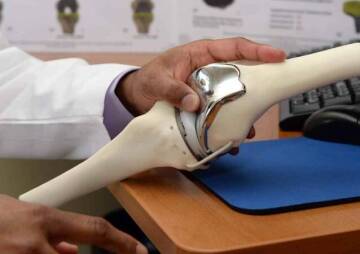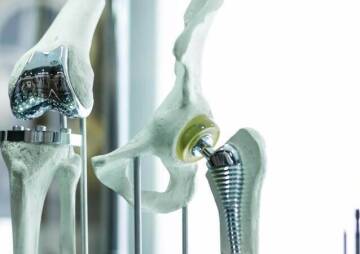-
Category
Craniomaxillofacial Surgery
Orthopedic Surgery
Spine Surgery
Orthopedic Implants
Hip Surgery
Knee Surgery
Pectus Excavatum
Bone Graft
Disinfectants
Healthcare
How Long Does a Knee Replacement Last?

One of the main concerns of patients undergoing knee replacement is the longevity of implants. But today, new ceramic implants can last 20 to 30 years if you take care of yourself.
Do you suffer from knee joint pain caused by osteoarthritis? Undoubtedly, you have tried various treatment methods to get rid of this discomfort. If your knee joint is damaged due to advanced osteoarthritis or for some other reasons, and non-invasive treatments are unsuccessful, you should consider having a knee replacement. Candidates for this surgery always have concerns about the surgical procedure, side effects, and longevity of the knee prosthesis. And one of the most asked questions is, "How long does a knee replacement last?" Most patients are aware that although a knee implant improves their quality of life, it will not last forever. The life of the knee prosthesis depends on different factors such as the patient's lifestyle, prosthetic material, and type of knee arthroplasty surgery. "How long does a knee replacement last?" If you want the exact answer to this question, stay with us until the end of this article.
A Brief Summary Of Knee Replacement Surgery
Knee replacement surgery, also known as knee arthroplasty, is one of the most common joint replacement procedures performed almost anywhere globally. Surgeons perform total knee replacement or partial knee replacement based on the patient's health and the severity of pain and damage. Total knee replacement is more common than the partial type, and in this surgery, all parts of the knee joint are replaced with an artificial joint. Knee arthroplasty is a challenging procedure and requires proper post-operative care and attention. As a candidate for knee replacement surgery, you must be prepared mentally and physically for surgery. Some patients expect that they will resume their favorite activities and sports following surgery, just like they do when they are healthy. But this is not true because an artificial joint will never be like a healthy joint. Although the operation will alleviate joint pain and discomfort, you can't engage in strenuous activities that put a lot of pressure on the knee.
Furthermore, some patients postpone surgery due to concerns about joint replacement complications, which may cause you don't achieve the desired result. But it is better to say that the possible post-operative complications are rare, and you can undergo this surgery with ease of mind. Doctors also believe that patients who delay their joint replacement are more likely to have a second knee replacement surgery because this is one factor that affects the prosthesis's longevity. Now it's time to look at other factors that affect the longevity of knee implants.
How Many Years Will My Knee Prosthesis Work?
Yes, an important question for almost all patients to know the answer. Total knee replacement has been practiced for approximately 30 years. During this time, scientists are trying to improve the implant material. Artificial implants can not last forever because they are usually made of metal and plastic, which will wear out like any other device. The knee is one of the most functional parts of the body that plays an important role in our daily activities, so it is natural to wear out after a while. But after how many years? This is important. According to statistics, the knee implant lasted about 10 to 15 years and then had to be renewed with secondary knee replacement surgery. Orthopedic implant manufacturers have been attempting for years to develop materials that can prolong the longevity of prostheses to twenty or even thirty years. Do you know the result of these efforts? Good news for you.
Also read: knees crack when squatting
The "30-Year" Knee Implant
The research of scientists and implant manufacturers finally came to fruition, and they were able to produce a knee implant that has a lifespan of about 30 years. But how? A few years ago, scientists introduced a new metal called Oxinium to avoid allergic reactions to trace amounts of nickel. This metal was formed by oxidizing zirconium, resulting in a ceramic surface. At the same time, scientists conducted laboratory studies to test the durability of Oxinium when combined with new polyethylene formulations in the knee device. After a while, the FDA granted a manufacturer permission to label the implant as "good for 30 years of use." This is phenomenal progress in the implant manufacturing industry and is good news for patients and physicians. But do these implants really last 30 years? Doctors say this is entirely up to the patients; for example, if you run or jump after a knee replacement and do strenuous sports simultaneously, it is clear that you will lose your implant soon.
Factors Affecting The Longevity Of Knee Replacement

Patients sometimes ask why their knee replacements have lost function after ten years. Several factors affect the lifespan of a knee replacement that can reduce the implant life by several years. Since there are hundreds of different types of knee prostheses as well as hundreds of patients with various physical conditions and lifestyles, it is not possible to accurately estimate how long the implants last for each person. However, some factors that have a significant impact on the life of implants are common to all patients, such as:
- Patients activities: Some patients do not rest well after joint replacement surgery. Even because the pain and stiffness of their knee joint disappear, they participate in strenuous activities such as climbing, running and jumping, etc. All of these activities cause the parts to wear out more quickly.
- Patients lifestyle: The wrong lifestyle, such as poor diet, improper sitting and standing, and incorrect bending forms, cause the implant to wear out.
- Obesity: Unfortunately, some patients cannot control their weight and become obese after knee replacement. Under these conditions, excess weight puts more stress on the joint replacement implant.
- Patient age: According to statistics, young people with artificial joints need secondary knee arthroplasty earlier than the elderly because young people are more active than older people and generally participate more in sports and strenuous activities.
- Complications: Although complications after knee replacement surgery are rare, their appearance is one of the factors that cause implant wear. Problems such as bone fractures around the joint replacement are common among old patients.
All these factors are common reasons for the artificial knee joint to wear out in a short time. If you take care of yourself and get enough rest in the recovery period, you would have completed the first phase of your healing period. And then you have to consider all the factors mentioned above. Otherwise, the problems with the artificial knee joint will start again and make your life difficult again. Knee replacement problems after ten years are an annoyance for patients who do not take care of themselves.
And the Last Word
The average knee implant lifespan is estimated to be 10-15 years. However, thanks to advanced artificial joint technology, manufacturers produce implants with new and durable materials that last 20-30 years. If you think you can do anything after surgery and your implant stays healthy for 20 years, you are wrong. Because having a healthy knee prosthesis for decades requires proper care and rest. So take care of yourself to enjoy life.
Reference: clevelandclinic.org






